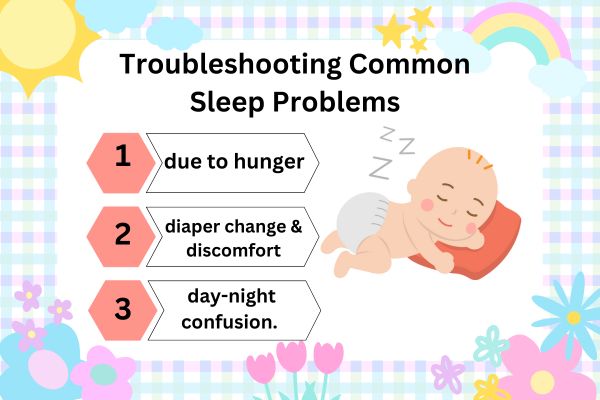As a new parent, the question “Why my newborn won’t sleep?” may dominate you, especially if you’re exhausted and in desperate need of a few hours of sleep. Newborns need a lot of sleep, but because of their erratic schedules, it can be hard to convince them to stay asleep through the night. “Should newborn daytime naps be in the dark?” is an additional query. Many parents ponder whether creating a dark environment throughout the day could promote healthier sleep habits. To assist babies differentiate between day and night, it’s important to balance day and night cues, even though some darkness may produce a peaceful environment.
This post will discuss some of the most typical causes of infant sleep issues, how to help them fall asleep, and how to establish a more regular sleep schedule. You’ll have a useful toolset at the end to help you recognize and meet your baby’s sleep needs.
Why Newborns Struggle with Sleep

Compared to adults, newborns typically sleep in shorter bursts. They also have lighter sleep cycles, which makes it easier for them to wake up. Newborns won’t sleep at night for the following main reasons:
1. Regular Feeding Requirements
Because of their tiny tummies, newborns must eat every two to three hours. They will get up to eat even in the middle of the night. Newborns require these frequent meals in order to grow, thus it’s a natural aspect of their growth.
2. Growth Spurts
Babies tend to feed more often during growth spurts. Your newborn may have sleep disturbances and wake up more frequently as a result of this increase in eating.
3. Day-Night Confusion
Your unborn child may have become accustomed to a routine that deviates from normal day-night cycles while still in the womb. Because they sleep more during the day and remain awake at night, newborns sometimes confuse day and night.
4. Excessive fatigue
Ironically, a newborn that is too exhausted could have trouble falling asleep. Your baby may get fussy and restless if they are up for an extended period of time, which will make it even harder for them to fall asleep.
5.The Moro Reflex (Startle Reflex)
Babies may “jump” in their sleep and wake up due to the Moro reaction, often known as the startle response. Although it might be annoying in the first few weeks, this is a typical reflex that diminishes as they become older.
6. Security and Comfort
Sometimes all your baby needs is a little more comfort. Your warmth, contact, and even heartbeat can help babies fall asleep while they become used to life outside the womb.
How to Help Your Newborn Sleep: Step-by-Step Guide

Follow these steps to establish a reassuring sleep schedule and take care of any problems that may be preventing your newborn from getting the sleep they require.
Step 1: Establish a Regular Sleeping Environment
Establish a stable, soothing environment for your baby. This entails maintaining a suitable temperature (ideally between 68 and 72°F), using white noise to simulate the reassuring sounds of the womb, and keeping the room softly lighted at night to help indicate when it’s time to go to sleep.
This setting can lessen your baby’s confusion between day and night by helping them link specific stimuli to sleep.
Step 2: Look for Sleep Cues
Newborns can express their fatigue in subtle ways, such as by rubbing their eyes, whining, or yawning. Try to put them to sleep as soon as you notice these signs. It may be simpler to fall asleep if you catch them at this drowsy time.
Step 3: For Comfort, Swaddle
Babies frequently wake up unexpectedly due to the Moro reflex. By keeping their arms and legs securely in place, swaddling can lessen the startle reflex. Make sure the swaddle is snug but not too tight, and use a soft, breathable one.
Step 4: Try Skin-to-Skin Contact
Having skin-to-skin contact can help calm your fussy or sleep-resistant newborn. By keeping your baby near and placing their head on your chest, you can simulate the womb environment for them by letting them hear your heartbeat and feel your warmth.
Step 5: Establish a Calm Nighttime Schedule
Your newborn will know it’s time to sleep if you have a regular nightly routine. To help them relax, you can think about: • Giving them a mild bath.
• Playing gentle music or singing a lullaby.
• Using a gentle, soothing tone when reading a short story—yes, even to newborns.
Step 6: Understand Nighttime Grunts
While they sleep, newborns can emit a wide range of sounds. This is perfectly natural if you’re wondering, “Why does my newborn grunt in his sleep?” Newborns may grunt, snort, or even sound suffocated since their breathing and digestive systems are still developing. These sounds are typically not cause for concern as long as your baby is not in pain.
Step 7: Promote feedings during the day
Encourage additional feedings during the day to help your newborn sleep through the night. Sometimes the need for nocturnal awakenings can be lessened by feeding often during the day.
Troubleshooting Common Sleep Problems

Sleep problems can still exist even with a good routine. The following are responses to some often asked questions by new parents:
My baby wakes up every hour; why is that?
Babies frequently wake up every hour because they are hungry, uncomfortable, or need to change their diapers. Additionally, some people could find it difficult to switch between sleep cycles. Frequent wake-ups can be decreased by maintaining a regular bedtime routine and making sure the pet is comfortable and fed.
How to Put a Baby to Sleep?
It takes patience to put a baby to sleep. You might still need to modify your strategy after completing the aforementioned procedures. To develop an earlier bedtime over time, for example, think about putting them to bed 10 to 15 minutes earlier each night.
Why Won’t My Newborn Sleep at Night?
Day-night confusion is probably the cause of your newborn’s unusually high level of alertness at night. Along with making your home a little darker and quieter at night, use gentle, stimulating activities to keep children up a little longer throughout the day. This may eventually cause their internal clock to change such that it more closely resembles the day-night cycle.
Essential Products to Help Your Newborn Sleep

Take into consideration these goods made to assist your newborn’s specific sleep demands to help you both sleep better. Thethings can contribute to the creation of a cozy, safe space that promotes improved sleeping practices.
1. Swaddle blankets:
A safe, airy swaddle lessens the startle reflex’s effects and gives your baby a sense of security. Choose solutions that are snug but kind to their sensitive skin, and that are simple to use.
2.White Noise Machine :
A white noise machine can produce a calming background that helps drown out any unexpected sounds that could wake your baby by simulating the soft, rhythmic sounds of the womb .3. Sleep sacks for babies :
A safe and comfortable alternative to swaddling is a baby sleep sack. These wearable blankets keep your baby warm without completely limiting their range of motion.
4. Gentle Bath Products for the Night :
A relaxing nighttime routine that indicates it’s time to wind down can include products like bath wash with lavender infusion
5. A chair that glides or rocks :
One of the best ways to put your baby to sleep is to rock them gently in a cozy rocker. Given that you might be using the chair for extended periods of time, pick one that you are comfy in!
Concluding Remarks on Improving Your Infant’s Sleep
Since each infant is different, it’s quite common for them to have erratic sleep schedules. You may find a rhythm that suits both you and your child with a little perseverance, consistency, and the appropriate strategy. Keep in mind that most babies start to exhibit more consistent sleep patterns by the time they are three to four months old, so these difficult evenings won’t last forever.
Therefore, you’re not alone if you’re thinking, “Why won’t my newborn sleep at night?” There are answers. Have faith in the process, adhere to these guidelines, and don’t be afraid to spend money on items that will help your baby sleep soundly. You two will eventually be obtaining the rest you require!
Frequently Asked Questions about why my newborn won’t sleep
1. Why is my newborn waking up every hour?
Because their stomachs are small and they must feed regularly, newborns wake up a lot. Additionally, their sleep cycles are shorter than those of adults, so waking up every hour or two is usual. Their sleep duration can be gradually increased by making sure they have a healthy meal before bed and by maintaining a calm environment.
2. How can I help my newborn sleep through the night?
Focus on creating a regular bedtime pattern and promoting more frequent feedings during the day to help your newborn sleep for longer periods of time at night. Over time, exposing them to natural daylight during the day and keeping the space calm and dimly lit at night can also aid in their learning to distinguish between day and night.
3. Why does my newborn grunt or make noises while sleeping?
Because their respiratory and digestive systems are still growing, newborns produce noises when they sleep. Unless they are accompanied by indications of discomfort, these noises—including grunts—are typically normal and not reason for alarm. As kids get older, they will typically outgrow this.
4. How can I get my baby to sleep without being held?
It can be difficult to move your infant from your arms to their sleeping area. Before bed, establish a soothing ritual, wrap them for safety, and lay them down when they’re tired but not yet asleep. This progressively teaches them to fall asleep on their own.





